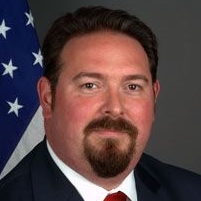Director of the Office to Monitor and Combat Trafficking in Persons: Who Is Luis C. de Baca?

President Obama turned to a career prosecutor with many years of experience in fighting human trafficking when he nominated Luis C de Baca to be the next Director of the Office to Monitor and Combat Trafficking in Persons at the Department of State. Confirmed May 6, 2009, de Baca holds the rank of Ambassador-at-Large and Senior Advisor to the Secretary of State. The Trafficking Office is statutorily mandated to coordinate U.S. government activities in the global fight against contemporary forms of slavery, including forced labor in factories, fields, homes and sweatshops, and the trafficking of women and children for sexual exploitation. Worldwide, there are estimated to be as many as 27 million persons living in slavery today.
De Baca’s great-great-grandfather, Ezequiel C de Baca, was New Mexico’s first elected Hispanic governor. Born in New Mexico, Luis C de Baca was one of three children born to Dr. Robert C de Baca, an animal scientist known as the “Father of the Iowa Beef Improvement Association,” and Mary (Marchino) de Baca. He grew up on a cattle ranch in Huxley, Iowa, where he was active in the local 4-H Club and graduated from Ballard High School. He earned a B.A. in political science from Iowa State University in 1990, and a law degree in 1993 from the University of Michigan Law School, where he was President of the Hispanic Law Students Association and an editor of the Michigan Law Review.
Straight out of law school, de Baca was hired by the Department of Justice to be involuntary servitude and slavery coordinator, a position he held until 2000, when he was named chief counsel of DOJ’s Human Trafficking Prosecution Unit. In that position, he tried more than 100 cases, including several high profile ones, such as U.S. v. Kil Soo Lee, which involved the enslavement of more than 200 Vietnamese and Chinese workers in a garment factory in American Samoa; the so-called “Deaf Mexican” slavery case, which involved scores of hearing impaired Mexicans who were lured to the U.S. with promises of employment and then forced to sell cheap trinkets on the streets of New York City, Chicago and other large cities; and U.S. v. Cadena, a path-setting prostitution slavery case in Florida. He was also instrumental in developing the victim-centered approach to combating modern slavery, which means that former slaves are assisted in establishing normal lives, rather than deported or otherwise treated as criminals. In 2007, de Baca was named counsel to the House Judiciary Committee, working for Chairman John Conyers, Jr. (D-Mich.), where his portfolio included national security, intelligence, immigration, civil rights, and modern slavery issues.
A Democrat, de Baca donated $2,250 to Democratic candidates and causes between 2001 and 2004.
The “C” in de Baca’s is part of his surname and stands for Cabeza.
- Matt Bewig
State Department Biography
Interview with Diana Scimone
From Christy Hall to the Halls in Washington DC (by Carolyn Manning, Nevada, Iowa Journal)
Moderated Discussion on Human Trafficking with Luis C. de Baca
Statement before the Senate Committee on Foreign Relations (PDF)
Obama’s Abolitionist (by E. Benjamin Skinner, Huffington Post)
Office to Monitor and Combat Trafficking in Persons (AllGov)
- Top Stories
- Unusual News
- Where is the Money Going?
- Controversies
- U.S. and the World
- Appointments and Resignations
- Latest News
- Trump Announces He Will Switch Support from Russia to Ukraine
- Americans are Unhappy with the Direction of the Country…What’s New?
- Can Biden Murder Trump and Get Away With it?
- Electoral Advice for the Democratic and Republican Parties
- U.S. Ambassador to Greece: Who is George Tsunis?






Comments